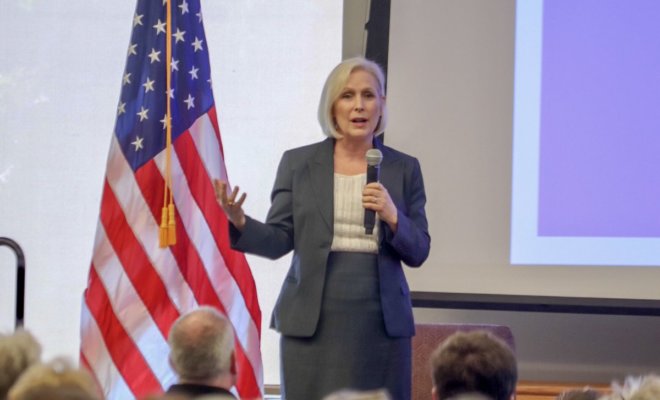Business
Revoking H-4 Visa Will Most Likely Affect Indian Women: Senators

Photo Credit: Twitter
Two Democratic women senators have urged the Trump administration not to revoke H-4 visas as it would impact over 100,000 women, mostly of Indian and South Asian origin.
Two Democratic women senators have urged the Trump administration not to revoke H-4 visas as it would impact over 100,000 women, mostly of Indian and South Asian origin.
H-4 visa is allotted to the partner of an H-1B visa holder to allow the spouse employment, education and other benefits under certain conditions. According to senators Kamala D. Harris (D-CA) and Kirsten Gillibrand (D-NY), revoking H-4 visa will affect highly-skilled immigrant women, as they will lose the opportunity to pursue their career and make them completely dependent on their spouse.
The Department of Homeland Security said that it was “making solid and swift progress in proposing to remove from its regulations on certain H-4 spouses of H-1B non-immigrants as a class of aliens eligible for employment authorization,” Indian newspaper Mint reported.
The move will affect South Asian women including Indians staying in the U.S., as it will take away their liberty to be employed. According to the letter, in 2017, 94 percent of H-4 visa holders with work authorization were women and 93 percent were from India. Currently, no more than seven percent of approximately 375,000 family and employment-based green cards issued annually can go to nationals from the same country. As a result, over 306,000 Indian applicants and 67,000 Chinese applicants whose applications have been approved are currently in line to receive a green card. Because of the backlog, H1-B visa holders and dependent H-4 visa holders from certain countries in the U.S. are forced to wait from 12 years to an impossible 150 years to receive green cards.
In a letter to DHS Secretary Kirstjen Nielsen and USCIS Director L. Francis Cissna, the senators said, “Rescinding the H-4 rule will result in significant personal hardship to women who will be forced to abandon their professional careers. Preventing women from engaging in employment can lead to isolation, depression, anxiety, feelings of guilt, and a loss of self-worth. Revoking a wife’s ability to work leaves her and her children entirely dependent on her spouse. Increased isolation – coupled with complete financial dependence— can make leaving an abusive relationship dangerous and, in some cases, impossible.”
Senator Kirsten Gillibrand stated in Twitter, “Now is the time for our country to come together and show that we value women. That we stand with women. That we will do what it takes to secure equality for women.
Now is the time for our country to come together and show that we value women. That we stand with women. That we will do what it takes to secure equality for women.
— Kirsten Gillibrand (@SenGillibrand) September 26, 2018
Citing the fundamental values of America, the letter said that taking away the equal opportunity of employment from H-4 visa holders will be antithetical to principles this country is built on. Talking about how the decision can permanently create a barrier for employment, the letter read “Strong, successful, female role models encourage children to set ambitious goals and be more confident in their own abilities” and “for these women, reinforcing a harmful stereotype that women do not belong in the workplace and widening the gender equality gap.”
“We urge you to consider the economic, psychological, and personal harms that rescinding the H-4 rule will cause to more than 100,000 professional women, their families, and their American communities”, the senators wrote to the officials.

You must be logged in to post a comment Login